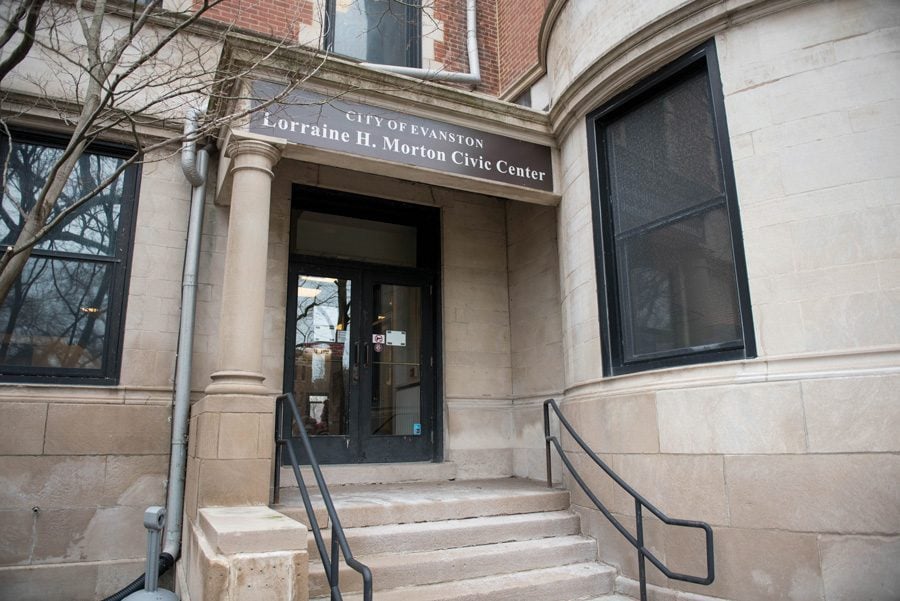Evanston makes progress on restorative justice implementation
Daily file photo by Katie Pach
The Lorraine H. Morton Civic Center, 2100 Ridge Ave. Last May, City Council passed an ordinance and a resolution regarding restorative justice practices.
October 15, 2019
Evanston is encouraging an increase in the use of restorative justice when handling juvenile cases, following the approval of an ordinance and resolution last May.
Restorative justice practices offer youth who have violated laws alternatives to arrest, fines or incarceration, which keeps their permanent records clean and doesn’t create future barriers to employment or education. The restorative justice project focuses on how to better support the child in the future.
“We want to be able to support children when they make mistakes,” said Patrick Keenan-Devlin, the executive director of the James B. Moran Center for Youth Advocacy. “Certainly not arrest them — but even hopefully not impose fines on them for their mistakes.”
Juvenile hearings are now separate from adult hearings, and the juvenile court meets once a month outside school hours.
The minor attends the hearing with their parents, and they have all the rights of due process: They can hire an attorney or represent themselves, call witnesses and argue their case, Keenan-Devlin said. In the instances where they are found liable or plead guilty to the offense, the judge offers them the option of either paying a fine or participating in the city’s restorative justice practices.
Roughly 10 children have gone through the new process since May, and Keenan-Devlin said almost every child has chosen the restorative justice option since the ordinance passed. If the family chooses restorative justice for the child, they meet with one of Evanston’s two youth advocates, who are also clinicians.
If a clinician determines a child might benefit from more support, they can connect the child with any of the nine community organizations that have signed on to offer support to the city. The nonprofits met in September to brainstorm strategies for helping children in the restorative justice program.
Susan Trieschmann, the executive director of Curt’s Café, said Evanston’s social justice reform has been over a decade in the making. But the legal-focused ordinance in 2019 has been the biggest win for restorative justice so far because of how far it goes to keep children from getting criminal records.
Curt’s Café is one of several community groups in Evanston that stepped forward to volunteer to be on the roster of service providers that collaborate with Evanston’s clinicians to create unique services and opportunities for children who are going through restorative justice.
The movement picked up speed in 2006 with efforts of Restorative Justice Evanston, a volunteer advocacy group, to implement restorative justice activities as a means of conflict mediation, said Arica Barton, one of the city’s youth advocates and clinicians.
Large-scale reform began in 2017 with the formation of the Alternatives to Arrest Committee, Keenan-Devlin said.
Ald. Peter Braithwaite (2nd) chaired the committee, and Keenan-Devlin served as a member. Since then, the committee has passed several ordinances that amend and expand the city code to help keep youth’s record’s “as whistle-clean as possible.”
So far, Keenan-Devlin said he’s noticed the clinicians’ ability to create individualized “repair of harm agreements” that meet the specific needs of each child.
He said that the challenge in coming years will be being sympathetic, empathetic, restorative and authoritative in more challenging situations or with older people.
“What I hope for our community is that this is just one program,” Keenan-Devlin said. “One manifestation of restorative justice, restorative programming that takes seed in our community.”
Email: [email protected]
Twitter: @theashowalter


